Common Trucks Involved in Truck Accident Lawsuits
A truck is a large vehicle used to carry and transport freight. Trucks come in a variety of different shapes and sizes and represent a broad range of different independent and commercial vehicles used for moving cargo, machinery, resources, and goods. The following list defines some of the various types of trucks and provides more information on common reasons to hire a truck accident lawyer.
Semi-truck Accidents
Semi-trucks are the most common type of truck on major highways and interstates. Semis are large and powerful front-end vehicles used for transporting, towing, hauling or moving exceptionally heavy and large volumes of cargo over long distances. Most often, semi-trucks consist of a driver’s front cabin, and a separate, rectangular container mounted on wheels. The fact that a semi-truck is composed of various parts renders the vehicle exceptionally hazardous if not properly connected. Semi-trucks can be as long as 80 feet and 14 feet wide, weighing up to 80,000 pounds with full cargo—resulting in increased times and distances for drivers to brake or come to a full stop on motorways. Semis are the most common type of truck accident that can require a truck accident lawyer to file a lawsuit.
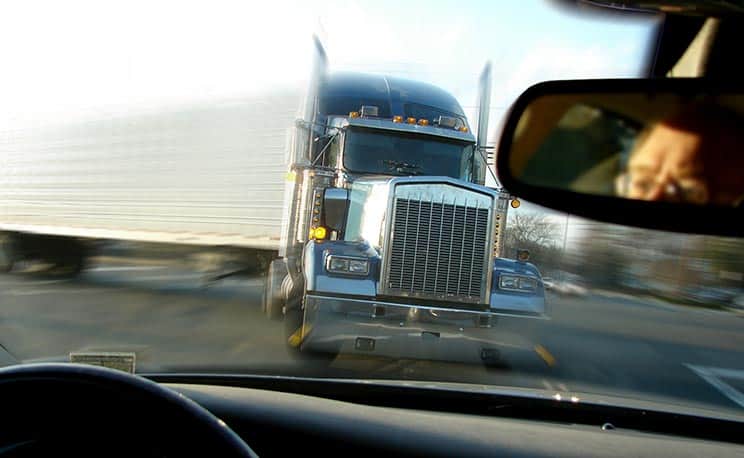
Garbage and Dump Truck Accidents
Garbage and dump trucks are frequently used in residential, metropolitan, and construction zones to collect, transport, and dispose of waste products. Often, these vehicles have hydraulic mechanisms that shovel, scoop and eject loose cargo, increasing the overall weight of the truck. Considering that garbage and dump trucks are prevalent in congested areas and make frequent stops, they present significant danger to pedestrians drivers, and passengers. Hiring an experienced truck accident lawyer is often times the only way to get the compensation that is deserved after an accident with a garbage or dump truck.
Log Truck Accidents
A logging truck is a large vehicle that transports raw materials and lumber in bundles. These vehicles are often equipped with enhanced suspension and off-roading tires that provide better traction on unpaved roads or paths. Due to the heavy lumber in transit, logging trucks are prone to accidents from improper loading and securing of cargo in tow. Logs and lumber can be overloaded and extend past the frame of the truck, presenting a considerable danger that impairs and limits the visibility of other drivers. Only an experienced truck accident lawyer will be able to navigate the complexities of a log truck accident lawsuit.
Tractor-trailer Accidents
A tractor-trailer is another configuration of a large truck cab with a trailer in tow, most commonly used for transporting heavy materials, equipment and loads. This kind of truck is characterized by a front cab for the driver that hauls an enclosed trailer on its back axles, similar to a semi-truck. Tractor-trailers are mounted on elevated frames with as many as 18 wheels. This configuration produces a high center of gravity which increases the likelihood of tipping. Experienced truck accident lawyers understand this issue as being commonly associated with tractor-trailers. Like most other trucks, tractor-trailers require powerful and maintained brake systems due to their significant size. These issues present significant risks, with arising issues including shifting cargo, poor braking ability, and lack of maneuverability.
Tanker Truck Accidents
Tanker or fuel trucks are a type of vehicle used in transportation of liquids, chemicals or gasoline. Instead of rectangular containers, tanker trucks haul insulated cylindrical enclosures. Most commonly, these containers are pressurized to protect its contents. Accidents with tanker trucks can be extremely hazardous due to potentially toxic or flammable cargo, such as gasoline, diesel fuel, industrial chemicals and radioactive materials. Sloshing, or the shifting of liquid within containers is dangerous to other drivers due to its ability to redistribute the weight of the truck and lead to the vehicle’s loss of control.
Tow Truck Accidents
Tow trucks are large vehicles equipped with cranes or large hooks that can be used to transport or move other vehicles. Most commonly, tow trucks are utilized in removing automobiles from unpaved surfaces or in moving or displacing damaged, non-functional automobiles to auto-body shops or other locations. Depending on the size of the tow truck, the vehicle in tow is mounted on the truck with its back wheels on the ground behind the truck. If the vehicle in tow is non-functional, this could endanger other drivers due to its ability to block the truck’s brake lights and turn signals.
Flatbed Trucks Accidents
Flatbed trucks are a type of large industrial vehicle that have an open and solid bed frame without a roof or fixed sidewalls. This configuration is used to transport goods or cargo that are often abnormal in size and exposed to open air. Much like other types of trucks, cargo hauled on flatbeds require sufficient securing and fastening to prevent shifting during transit. This open exposure can be potentially dangerous on the road due to the positioning of the cargo and its exposure to other trucks and passenger vehicles.
Emergency Vehicle Truck Accidents
Truck accident lawyers understand that emergency vehicles include automobiles that are authorized to respond to crises, especially in life threatening situations. Even though these emergency vehicles are operated by law enforcement, fire departments, urgent medical response teams and government agencies, they still cause hundreds of accidents yearly. Common examples of these vehicles include ambulances, fire trucks and vans used by public utility workers or police. Emergency vehicles are especially prone to accidents on major motorways due to their ability to disobey conventional traffic laws and regulations, whilst travelling at high speeds. While most emergency trucks are equipped with audible and visual warning devices for fellow drivers, they present a high risk on the road.
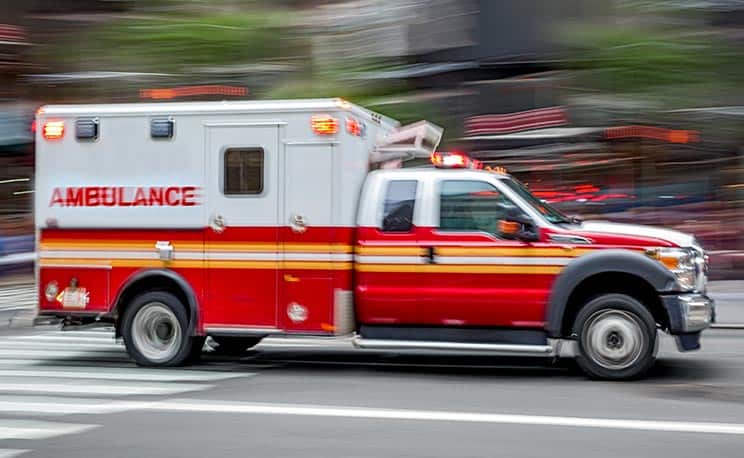
Construction Truck Accidents
Construction trucks are used primarily to transport heavy machinery, equipment and resources to and from job sites. As a result, minor to major damage occurs on vehicles and persons every year. Examples of machinery and equipment used in transport may include commercial construction trailers, displaced land, or other materials. As with many other large trucks, construction vehicles have an extended blind spot and improperly loaded materials can fall onto roadways, resulting in significant injury to other drivers. Truck accident lawyers are able to work with the damaged parties to get them back on the road again.
What Incidents Cause Truck Accidents?
The variety and prevalence of trucks on American roads presents significant danger to other cars, trucks and motorcycles on the roadway. Trucks, just like other passenger and cargo vehicles, can be involved in a variety of accidents. Unfortunately, due to the size and weight of these vehicles, the resulting accidents are frequently more damaging and devastating, requiring a need for an experienced truck accident lawyer.
Common Causes of Truck Accidents
Common causes of truck accidents may be due to the following incidents:
- Tire Blowout – caused by excessive heat and worn down threads on rubber tires from extended use or adverse road conditions
- Wide Turns – since trucks occupy more space than passenger vehicles, they often require the use of multiple lanes when making turns in traffic
- Under Ride – the high positioning of truck cabs and trailers provides an opening that can trap or wedge vehicles in the case of a collision
- Jackknifing – a type of accident that occurs when the driver of the truck loses control, causing the cab and trailer to skid in different directions, often overturning in the process
- Rear-end – colliding to the backside of another vehicle in traffic
- Lost Load – occurs when cargo is loose, improperly secured and unfastened or due to excessive speeds or rough road conditions; can also occur during a collision or accident
- Blind Spots – represent the area surrounding the vehicle that is not easily viewed or observed by the driver due to the positioning of the cab and its trailer
- Truck Rollovers – occur in adverse traffic conditions, especially due to hydroplaning or uneven surfaces and when making turns; rollovers can be facilitated by sliding or shifting cargo in tow
- T-Bone (Side Collision) – a collision that often occurs in intersections when a truck or passenger vehicle crashes into the side of another vehicle
- Head-On Collisions – an often deadly crash that occurs when the front-end of two moving vehicles crash into each other
Causes of Truck Accidents Caused by Truck Drivers
Operational error represents a broad category of mistakes made by truck drivers that occur as the result of inadequate or dangerous decisions made while in motion. The Law Center truck accident lawyers recommend drivers be aware of situations that can further complicate accidents caused by truck drivers; including excessive speeds and an inexperienced driver:
- Poor maintenance – due to the extensive use of trucks and their accumulated mileage, trucks require frequent and sometimes expensive maintenance or repairs; poor maintenance can be the result of inexperience or neglect by the operator
- Overloading cargo – disregarding dimensional and weight-oriented specifications for loading cargo on a truck can result in overwhelming the truck frame and lead to significant damage or injury
- Driver fatigue – because truck drivers often travel long distances, fatigue and low concentration can occur and results in delayed reactions and limited alertness
- Improper training – with young or inexperienced drivers, inadequate training can result in major damage or injury due to the complex ability to maneuver and control large vehicles
- Road rage – occurs when motorists are provoked or angered by the actions of another vehicle on the motorway, often leading to aggressive driving and hostile decision-making
- Failure to obey proper driving rules – represent errors made by any vehicle operator that chooses to disregard traffic regulations or not use safety mechanisms such as turn signals and maintaining speed within the posted limit
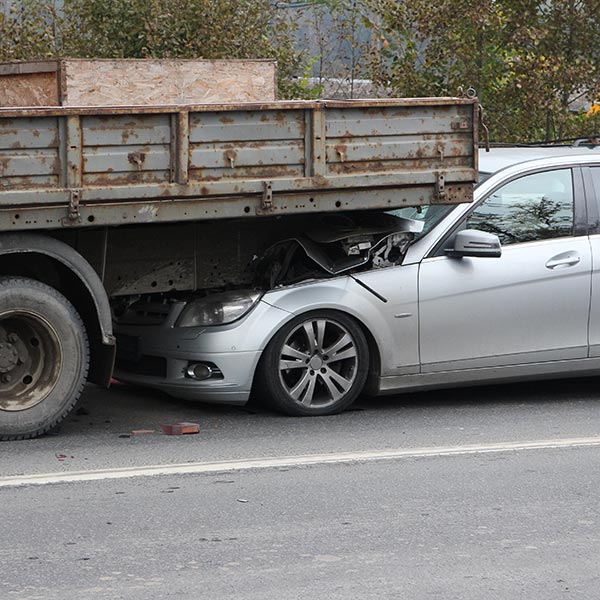
Causes of truck accidents caused by passenger vehicle drivers
- Failure to pull onto the shoulder properly – passenger vehicles that make emergency stops on the sides of roadways or on the shoulder of highways can be dangerous to passing trucks or large cargo vehicles.
- Dangerous passing – on the highway, trucks often travel at a consistent speed and cannot quickly adapt to the changing speeds of traffic. This may result in accidents with cars that attempt to pass trucks, especially when the cars are not visible due to the truck’s extended blind spot
- Lane changes – passenger vehicles that attempt to pass larger trucks or that pull out in front of them can cause accidents due to the slowed reaction and ability to brake, further complicated by the limited visibility of its operator
Truck accidents caused by signage and road conditions
The Law Center truck accident lawyers believe hidden, missing or improper signage and inadequate road conditions play an equally important role in truck accidents. Temporary signage, especially along designated road or highway construction zones can be dangerous for trucks and passenger vehicles. These signs often warn drivers and motorists of sudden or unusual conditions or the presence of obstacles on roadways. For example, these signal sudden curves, changes in speed limit, uneven surfaces or the presence of road crews and parked construction vehicles. Due to the temporary and sometimes inconspicuous placement of these signs, drivers may not be aware and unknowingly enter into a precarious zone without taking proper precautions. This can result in serious injury and danger to other motorists.
What are the common injuries of truck accidents?
The Law Center truck accident lawyers are very familiar with supporting their clients through injuries due to truck accidents. As aforementioned, trucks can cause serious damage to an object or vehicle in the event of an accident. Collisions with trucks often result in the following injuries and may require significant medical treatment:
- Brain injuries
- Spinal cord injuries
- Back and neck injuries
- Broken bones
- Torso and rib injuries
- Cuts and lacerations
- Internal organ injuries
- Amputated limbs
- Paralysis
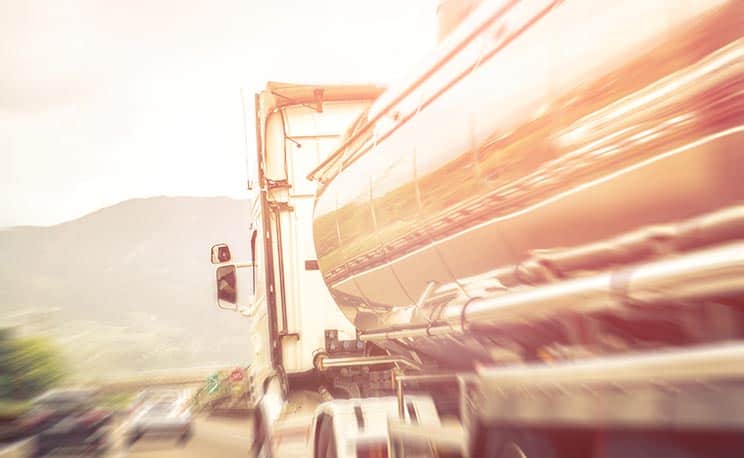
What should I do if I’m in a truck accident?
If you have been involved in an accident with any type of truck, you may be entitled to financial compensation due to any resulting injuries. In the event of an accident, it is important to contact an experienced truck accident lawyer or legal team to determine liability and discuss next steps to pursue litigation. Any party involved in an accident should seek a consultation meeting with a legal expert in the aftermath of an accident, especially before agreeing or accepting any compensation packages from responsible parties or insurance companies. It is important to disclose all information pertaining to the incident and work in a timely manner with a specialized attorney who can assist in filing relevant claims and lawsuits that will ensure you receive sufficient compensation for physical or material damages.
Filing a Truck Accident Lawsuit
If you or someone you know has an accident with a truck, it is important that you report all relevant details of the incident to authorities and make this documentation available to your attorney or corresponding legal team. If you are the victim of a truck accident, filing a lawsuit with a truck accident lawyer can facilitate payment for any incurred medical costs, lost wages, and punitive damages. Additionally, economic reimbursements in trucking accidents can also be used to cover repairs, treatment and future medical complications in the case of injury.
How do I know if I have a truck accident claim?
While truck accident lawyers understand that laws and regulations vary according to the state in which the accident occurs, there are important considerations to take into account when determining your right to compensation. Truck drivers and their corresponding employers are legally obligated to abide by state and federal policies, as outlined by the Federal Motor Carrier Safety Administration. These policies stipulate various protocols for operators and contractors of trucks and large cargo vehicles.
Many state policies are standardized, but there are several key differences which may drastically affect the outcomes of truck accident lawsuits. Examples of differing laws and regulations across state lines include:
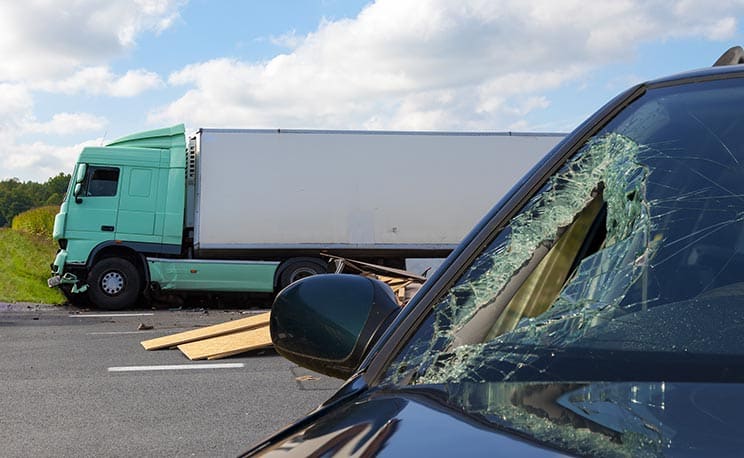
- Florida: State law regulates and requires the systematic monitoring of criminal records of licensed truck drivers. Operators with Florida driver’s licenses cannot have any previous convictions or outstanding driving violations. Additionally, all commercial and cargo vehicles in Florida have to meet specific height, length and width criteria to legally use public roadways.
- Georgia: In Georgia, those who are at fault for causing truck accidents that involve personal injury are responsible for all direct and indirect damages. This renders Georgia as an “at-fault” state which has broader consequences in litigation involving commercial cargo carriers.
- Texas: Title 7 of the Texas Transportation Code specifies that all truck drivers carry state-specific forms that authorize, document and detail various information about the manufacture, packaging and delivery of all cargo aboard. Texas law also requires that drivers who operate commercial vehicles meet specific medical standards and have a mandated eight consecutive hour break after every shift, which cannot exceed 12 hours.
- Alabama: The Alabama Department of Transportation requires all truck drivers to pass a written exam before a commercial license is authorized. There are strict state laws prohibiting the use of mobile phones and devices while operating moving vehicles, which has drastic implications on liability determinations in the case that electronics cause an accident.
- California: In the event of injuries caused in automobile or truck accidents, California Vehicle Code requires anyone on the scene to provide and report reasonable assistance to all injured parties. California laws mandate the disclosure of documentation for any accident that causes property or vehicle damage, or else responsible parties could be charged in criminal court with hit-and-run.
- Louisiana: The Louisiana Civil Code outlines a unique statute of limitations for reporting accidents with large vehicles and lists specific protocols for removing vehicles and cargo from roadways after an accident. Louisiana also has unique requirements for minimum insurance coverage, requiring all displayed placards with this information by all commercial vehicles in operation within the state.
Should I hire a truck accident lawyer?
Enlisting the help of a legal specialist or truck accident lawyer is one of the best actions in the aftermath of a devastating accident with a truck or cargo carrier. A truck accident lawyer’s advanced knowledge on rights, protocols and legal procedures enable them to provide actionable solutions in the wake of tragic accidents. The injured may be entitled for compensation related to pain and suffering, medical expenses, medical bills or other. Accidents involving commercial trucks are most often handled by the contracting company’s legal counsel. Reaching out to an attorney specializing in truck accidents can better consolidate communications and ensure proper legal coordination in the best interest of those involved.
Who can be held responsible in a truck accident lawsuit?
Due to commercial activity by most large trucks, there are discrepancies in the allocation of legal responsibility in any accident involving a truck, especially those that cause significant injury or death. The following can be held liable in a truck lawsuit:
- Driver
- Driver contractor
- Trucking company
- Truck Driver’s Employer
- Cargo Owner/Manufacturer

How do I file a truck accident lawsuit?
While it is technically feasible to file a truck accident lawsuit on one’s own, filing claims and lawsuits without a proper truck accident lawyer can unintentionally harm the viability of a claim and result in a lower settlement. To file a truck accident lawsuit, it’s imperative the injured hire adequate legal representation to ensure proper protection of victims.
How are truck accident lawsuits different from vehicle accident lawsuits?
Although the damage involved in accidents with trucks or cargo vehicles is more detrimental, truck accident lawsuits are similar to those involving passenger vehicles. There are some fundamental differences to take into account. For example, trucks that are operating on behalf of businesses are subjected to more strict regulations than passenger vehicles. In the case of an accident involving a large vehicle or cargo trailer, there are certain licenses, regulations and mechanical specifications that need to be in place for the truck to legally operate on public motorways. In addition, truck accident lawsuits will often involve more third party entities in the lawsuit than in vehicle accident lawsuits.
Were you involved in a truck accident?
If you or someone you know was involved in an accident with a large truck or commercial vehicle, it is important that you notify the appropriate law enforcement and emergency medical services. It is then advised to seek legal advice from a truck accident lawyer or truck accident law firm that fully understands the complicated processes involved in filing claims and pursuing lawsuits against commercial truck operators and their contractors, especially if the affected party or parties were not at fault.
The Law Center Can Help
In the event you are involved in a truck accident, The Law Center is uniquely positioned to help. We’ve partnered with the premiere truck accident attorneys in the United States. The Law Center will connect you with a legal team who is best suited for your case. Our partners have recovered billions of dollars for people hurt, injured, and in need of help. Let us help you become whole. Fill out the form below or call 866-465-1419 for immediate assistance.